 Wooargh! The lights! The shapes…the colours….all that swirling…and moving…have I gone back in time to a chemically assisted squat rave?
Wooargh! The lights! The shapes…the colours….all that swirling…and moving…have I gone back in time to a chemically assisted squat rave?
Sadly not: instead, I’m being mesmerised by Jeff Minter’s Llamasoft graphics, a cutting edge music visualisation system designed for Microsoft’s Xbox 360.
Based on Neon, Llamasoft’s proprietary graphics technology, the Llamasoft Visualiser comes pre-installed on Xbox360s and it’s “capable of generating anything from soothing ambient swirls to strobing multicolour explosions.”
 The mind-melding visual feasts are driven by beat detection or joypad control, letting users take interactive control of the camera, patterns and effect generators, to create their own psychedelic wig-outs.
The mind-melding visual feasts are driven by beat detection or joypad control, letting users take interactive control of the camera, patterns and effect generators, to create their own psychedelic wig-outs.
The results are pretty damn amazing, with the silky smooth, rock-solid rendering engine creating a brain-troubling swathe of swirling, abstract, multi-layered psychotropic imagery.
The effect is so convincing, that all you’d need is some 2,000 watt techno blasting out, a floor covered in spent beer cans, a few ‘funny’ cigarettes and you could recreate the perfect rave in your bedroom.
 We’ve liked Jeff Minter’s stuff ever since the days when an Amiga 1200 (RIP) with 4meg of RAM was considered positively ostentatious. Even then his Llamatron was streets ahead of the competition, so it’s great it see the spliff-consuming, loveable hippy still producing such great work.
We’ve liked Jeff Minter’s stuff ever since the days when an Amiga 1200 (RIP) with 4meg of RAM was considered positively ostentatious. Even then his Llamatron was streets ahead of the competition, so it’s great it see the spliff-consuming, loveable hippy still producing such great work.
“Without giving any secrets away and getting myself into trouble with Microsoft,” enthused Minter, “I can tell you that the Xbox 360 can bring to bear an absolutely staggering amount of computational power on each and every pixel, and never drop below 60 frames a second.”
 And he’s still got his principles too, writing on his bulletin board: “And we haven’t sold our souls, or our IP, to Microsoft either. We’ve created for them an interactive visualiser for the Xbox360, and we’ll not do a visualiser for the rival consoles for this coming generation. But if someone were to ring me up tomorrow and say “Blimey Yak mate, that Neon’s a bit tasty, any chance of a bit of that for the next “not_a_console_visualiser_app” I could quite legitimately say “abso-smegging-lutely!” and we could be delivering working code in a few weeks. We can use it in games on *any* platform. The engine is small, efficient and portable.”
And he’s still got his principles too, writing on his bulletin board: “And we haven’t sold our souls, or our IP, to Microsoft either. We’ve created for them an interactive visualiser for the Xbox360, and we’ll not do a visualiser for the rival consoles for this coming generation. But if someone were to ring me up tomorrow and say “Blimey Yak mate, that Neon’s a bit tasty, any chance of a bit of that for the next “not_a_console_visualiser_app” I could quite legitimately say “abso-smegging-lutely!” and we could be delivering working code in a few weeks. We can use it in games on *any* platform. The engine is small, efficient and portable.”
Bless him.
 Although Nintendo’s
Although Nintendo’s 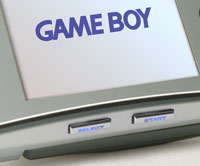 “We’re making the gorgeous Game Boy Micro for image-conscious folks who love video games, the ones who want the look of their system to be as cool as the games they play on it,” waffled George Harrison, who has one of the longest job descriptions we’ve seen for a while: Nintendo Of America’s Senior Vice President Of Marketing And Corporate Communications.
“We’re making the gorgeous Game Boy Micro for image-conscious folks who love video games, the ones who want the look of their system to be as cool as the games they play on it,” waffled George Harrison, who has one of the longest job descriptions we’ve seen for a while: Nintendo Of America’s Senior Vice President Of Marketing And Corporate Communications. Wrapping up the feature list, the Game Boy Micro comes with a built-in, rechargeable lithium-ion battery, supports standard headphones and comes with a removable face plate for that all-important customisation thang.
Wrapping up the feature list, the Game Boy Micro comes with a built-in, rechargeable lithium-ion battery, supports standard headphones and comes with a removable face plate for that all-important customisation thang. Pausing briefly for breath after announcing the new PlayStation today, the busy bees in the Sony hive have announced the world’s smallest and lightest high definition consumer camcorder with full HD resolution based on HDV 1080i.
Pausing briefly for breath after announcing the new PlayStation today, the busy bees in the Sony hive have announced the world’s smallest and lightest high definition consumer camcorder with full HD resolution based on HDV 1080i.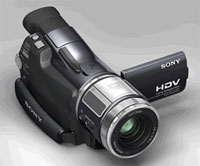 The new camera also uses a smaller and more compact Carl Zeiss lens, with a diameter of 60mm compared to 92 mm on the previous model.
The new camera also uses a smaller and more compact Carl Zeiss lens, with a diameter of 60mm compared to 92 mm on the previous model. A Memory Stick PRO Duo media slot is provided for transferring images captured on the camcorder’s 2.8-megapixel still camera.
A Memory Stick PRO Duo media slot is provided for transferring images captured on the camcorder’s 2.8-megapixel still camera. The Nokia 6680 imaging smartphone has been declared the new ‘Best in Class’ 3G device according to a report by Strategy Analytics.
The Nokia 6680 imaging smartphone has been declared the new ‘Best in Class’ 3G device according to a report by Strategy Analytics.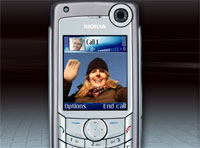 The report noted strong deviations (oo-er!) in the results of these evaluations by gender with the lay-deees preferring the Sony Ericsson and NEC devices, whereas the geezers exhibited a strong preference for the Nokia and Motorola handsets.
The report noted strong deviations (oo-er!) in the results of these evaluations by gender with the lay-deees preferring the Sony Ericsson and NEC devices, whereas the geezers exhibited a strong preference for the Nokia and Motorola handsets.
 Microsoft has released the final version of MSN Desktop Search, offering new features based on extensive user feedback and boasting extended support for file types.
Microsoft has released the final version of MSN Desktop Search, offering new features based on extensive user feedback and boasting extended support for file types. These advanced indexing options also let users specify file types to be indexed as text, create a list of file types that should not be indexed, decide the location of the index file and boost the priority of the indexing process (although this may cause some PCs to run as slow as a tired sloth on Mogadons, but at least it can be turned off).
These advanced indexing options also let users specify file types to be indexed as text, create a list of file types that should not be indexed, decide the location of the index file and boost the priority of the indexing process (although this may cause some PCs to run as slow as a tired sloth on Mogadons, but at least it can be turned off). As is the norm with search toolbars, there’s a pop up blocker and form-filler installed, although there’s still no Firefox-style tabbed browsing on offer, although MSN says it will be added soon.
As is the norm with search toolbars, there’s a pop up blocker and form-filler installed, although there’s still no Firefox-style tabbed browsing on offer, although MSN says it will be added soon. Sony has unveiled prototypes of their new Playstation 3 console at the Electronic Entertainment Expo (E3) in Los Angeles.
Sony has unveiled prototypes of their new Playstation 3 console at the Electronic Entertainment Expo (E3) in Los Angeles. Sony are currently collaborating with the world’s leading tools and middleware companies, to provide developers with extensive tools and libraries to make the best of the Cell processor and enable efficient software development.
Sony are currently collaborating with the world’s leading tools and middleware companies, to provide developers with extensive tools and libraries to make the best of the Cell processor and enable efficient software development. BBC New Media is to extend trials of its interactive Media Player (iMP), allowing viewers to download material from 500 hours of its television and radio programming.
BBC New Media is to extend trials of its interactive Media Player (iMP), allowing viewers to download material from 500 hours of its television and radio programming. The 5,000 trialists will be able to search for programmes they want to watch, filter programmes by channel, select subtitles and, in the case of some series, to collect and watch episodes that they may otherwise have missed.
The 5,000 trialists will be able to search for programmes they want to watch, filter programmes by channel, select subtitles and, in the case of some series, to collect and watch episodes that they may otherwise have missed. The pilot will use DRM software to delete programmes seven days after the programme has aired on TV, ensuring that users can no longer watch the content after that time. The digital rights system will also prevent users emailing the files to their chums or sharing it via disc.
The pilot will use DRM software to delete programmes seven days after the programme has aired on TV, ensuring that users can no longer watch the content after that time. The digital rights system will also prevent users emailing the files to their chums or sharing it via disc. AOL today trumpeted its intention to muscle into the UK phone business with the launch of a home service offering unlimited calls for an introductory flat rate of £7.99 (~US$14, ~€11) per month.
AOL today trumpeted its intention to muscle into the UK phone business with the launch of a home service offering unlimited calls for an introductory flat rate of £7.99 (~US$14, ~€11) per month. Johnny-come-lately subscribers signing up after 30 June 2005 will pay this standard monthly subscription fee.
Johnny-come-lately subscribers signing up after 30 June 2005 will pay this standard monthly subscription fee.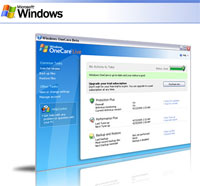 Microsoft has announced that it would begin testing OneCare Live – a PC-health care fix-it all application – with a general release sometime next year.
Microsoft has announced that it would begin testing OneCare Live – a PC-health care fix-it all application – with a general release sometime next year.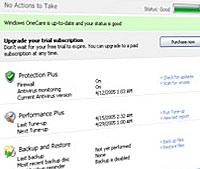 OneCare is a separately sold subscription-based service designed to work as a mainly “hands-off” application, quietly doing its good deeds in the background while sending security updates to users’ computer systems without them having to download or install the fixes.
OneCare is a separately sold subscription-based service designed to work as a mainly “hands-off” application, quietly doing its good deeds in the background while sending security updates to users’ computer systems without them having to download or install the fixes. The BBC has let rip with a new beta service that invites Web developers and designers outside of the organisation to start fiddling about with their content and “create cool new things”.
The BBC has let rip with a new beta service that invites Web developers and designers outside of the organisation to start fiddling about with their content and “create cool new things”. The UK broadcasting goliath made a commitment to support social innovation in response to last year’s Graf Report, and this is echoed in their plans to develop an open community where people can share expertise, ideas, and collaborative efforts.
The UK broadcasting goliath made a commitment to support social innovation in response to last year’s Graf Report, and this is echoed in their plans to develop an open community where people can share expertise, ideas, and collaborative efforts. It’s not all about profit though, with the BBC hoping that contributors will create prototypes on their Web sites to be freely shared with others for non-commercial use.
It’s not all about profit though, with the BBC hoping that contributors will create prototypes on their Web sites to be freely shared with others for non-commercial use.